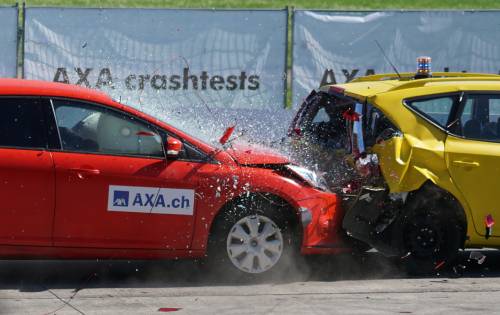A car accident can be a jarring experience. One moment you might be minding your own business and the next you’re facing painful injury and perhaps a few ailments you don’t immediately notice. We’re talking about post traumatic stress disorder or PTSD, which affects many people after they have been in a car accident.
The resulting PTSD effects can last longer than your physical injuries.
What follows is a rundown of the effects of PTSD and the help that may be available to you during this trying time. Just know that help is available.
If you feel that you are suffering from post traumatic stress injury following a car accident, the qualified attorneys at The Accident Injury Law Center can help. Call now for a free case review or keep reading to see if you have PTSD and learn about the options available to you following your devastating wreck or accident.
What is PTSD?
The DSM-IV-TR (Diagnostic and Statistical Manual of Mental Disorders) states that to be officially diagnosed with post traumatic stress disorder, a person must have experienced, witnessed, or been confronted by a particular event that involved death (actual or threatened) or severe injury, to which the person responded with intense helplessness and fear.
PTSD can make life extremely difficult. It can negatively affect your home and work life, as well as your relationships. Therefore, it is critical that you get help for PTSD following an accident or injury as soon as possible, especially if you have traits that make you susceptible to post traumatic stress disorder.

Are You Susceptible to PTSD?
The Mayo Clinic has identified a list of characteristics that make a person more likely to suffer PTSD following an accident or injury. These include a lack of proper support from family and friends, suffering other mental health issues like anxiety, having a family history of mental problems, and having a job that consistently exposes you to traumatic events.
Symptoms of PTSD
PTSD can affect individuals in various ways. Some may find themselves reliving the accident in nightmares or through daydream flashbacks. While driving, you may find yourself overcome with terror that forces you to pull to the side of the road.
Severe anxiety can manifest in people with PTSD, and this nervousness can make it difficult to sleep and concentrate. You may find yourself blaming yourself for the accident and overcome with a sense of guilt or shame.
53% of PTSD sufferers experience mood disorders following a vehicular accident and 41% experience major depressive episodes.
Others completely block the accident out, preventing them from being able to recall significant details about the accident afterward. You may find yourself feeling intense feelings of betrayal, depression, hopelessness, and mistrust of anyone or anything.
Have you been injured and was it someone else’s fault?
Call (714) 591-0661 now to speak to an attorney for free.
Click the orange button below to have us call you.
Children with Accident Related PTSD
Adults aren’t the only ones who can be affected by a car crash or serious accident. Kids, too, can suffer the effects of PTSD. Worse is that children aren’t wise enough to realize what is going on. Their minds are still developing, so in many cases, the PTSD hits children the hardest. In fact, children are prone to severe trauma following events like a car crash, according to the NCTSN or National Child Traumatic Stress Network.
Determining whether a child has PTSD can be challenging, as stress disorders can affect children differently, depending largely on age and maturity level. Young children might suddenly become fearful of the dark or might start wetting the bed out of the blue. Others may experience separation anxiety where before they could be left in solitude without trouble.
Older children may have outbursts at school or suffer nightmares, have headaches, or have trouble sleeping. Others might display signs of depression and anxiety, and many may develop a fear of getting behind the wheel once they reach driving age.
PTSD Following an Accident Can Be Treated
To treat post traumatic stress disorder means to improve your symptoms, teach you skills to deal with the intense feelings, and restore your self-esteem. Experts recommend two approaches to treating post traumatic stress disorder: Psychotherapy and medication.

Psychotherapy to Treat PTSD
– Cognitive Processing Therapy (CPT)
Cognitive Processing Therapy covers a 12-week course of weekly sessions lasting for 60 to 90 minutes. During these sessions, you will find yourself discussing the accident with your therapist and how your life has been affected in the aftermath. Talking about the incident with a licensed professional can help you unpack all the trauma so that you can figure out new ways to cope.
These sessions are designed to alleviate the self-blame and any shame you feel about the accident. More than that, the therapy allows you to understand and accept what happened so that you can move forward positively toward the next chapter of your life.
– Prolonged Exposure Therapy
In some cases, a major car wreck can cause you to avoid situations that remind you of the traumatic event. If you were injured by a big rig truck, for example, the mere sight of one of these 18-wheelers might trigger a negative reaction. Similarly, sounds normally associated with everyday traffic might set off symptoms of depression and anxiety, causing you to avoid loud engine noises, honking horns, and other sights and sounds that bring the accident back to the top of your mind.
This type of avoidant behavior can wreak havoc on other areas of your life, but PE can help.
Prolonged exposure therapy involves 8 to 15 sessions that usually run around 90-minutes each. Typical sessions include breathing exercises to reduce anxiety as you recount the event and all the details that led to your injury and PTSD. Eventually, you will take the gradual steps to face your fears until they no longer cause so much distress.
– Medications
A major car accident that results in PTSD can change the inner workings of your brain. Sufferers of PTSD process threats differently than non-trauma victims, due to an imbalance of chemicals called neurotransmitters. Essentially, this means that your body’s fight or flight response is out of whack, causing you to feel jumpy and on-edge, making it nearly impossible to relax.
Medications can regulate how you process feelings like fear and anxiety.
Get Help Following an Accident or Injury
Following a car crash or some other type of accident, you may find yourself having to prove that you suffer from PTSD. This may be the case if you are pursuing a settlement or wish to treat the disorder but need money from the insurance company to do so. Proving your PTSD to the court or insurance adjusters is not easy, especially if there are young children involved who cannot fully verbalize their experience and the aftereffects. This is why it is critical that you get the services of a qualified personal injury attorney.
Just like physical injuries, mental injuries are compensable under the law, which means that your PTSD following a car crash or accident is the ideal scenario to hire a personal injury attorney to represent you. The ideal lawyer will explain your case and the options available to you. Your lawyer can also help you prove your PTSD to all necessary parties so that you receive the compensation you deserve.
PTSD is only one issue that can plague you following a significant accident. You may also be experiencing chronic pain, or the accident may have left you disabled and without a paycheck. If you have been hurt in an accident, help is closer than you think. Call the Accident Injury Law Center, where our experienced and compassionate personal injury lawyers are ready to represent you. Call now for a free case review.
Need Help with Your Legal Matter?
Call (714) 591-0661 to speak to a lawyer.

